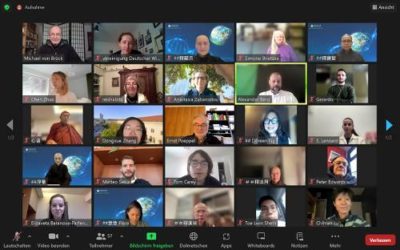This year’s Winter School, organized by the Federation of German Scientists (VDW e. V.) in collaboration with the Ludwig-Maximilians-University of Munich (LMU), Germany, and the University for Life and Peace (ULP), Taiwan, unfolded under the question What are the neurocognitive and social mechanisms needed for an ecological turn? Running from October 28 to December 3, the program brought together students from over 20 countries, each bringing a diverse range of expertise. Together, they delved into the pressing issues of global warming and biodiversity loss, seeking to bridge the gap between environmental awareness and the effective implementation of solutions.
The winter school was divided into three blocks. During the first block, students were able to discuss with and receive input from internationally recognized experts in the field of ecological and economic sustainability, spiritual humanism, and leadership for change. In the first lecture, Prof. Dr. Ernst Ulrich von Weizsäcker spoke about how a social and economic transformation can succeed, touching upon the need for a new enlightenment, the United Nations‘ Sustainable Development Goals (SDGs), and the urgency to decouple prosperity from growth.
The second lecture was held by Prof. Dr. Wang JianBao, who introduced the perspective of „Spiritual Humanism,“ explaining that it aims to initiate an ecological turn from the Confucian doctrine. He illustrated the historical development of Confucianism and elaborated upon the complex mutuality between the human self and her ecosystem.
The third lecture was held by Christian Felber, who introduced the Economy for the Common Good, an economic model, that makes a good life for everyone on a healthy planet its primary goal and purpose.
The last lecture of this block was held by Dr. Maria Reinisch. She talked about the biggest challenges of our time and the key ingredients of good leadership needed to address these challenges. Between the lectures, participants joined group discussions on the themes that interested them most.
During the second block, the participants worked in international and interdisciplinary groups on potential solutions and approaches to make the ecological turn successful.
The group sessions were accompanied by three more inputs from experts: Prof. Dr. Sabin Bieri talked about how food systems can serve as powerful levers for transformation.
In his lecture, Prof. Dr. Ulrich Bartosch introduced the encyclical „Laudato Si“ as a holistic approach towards the ecological turn and spoke about the urgent challenge ‚to protect our common home,‘ as Pope Francis formulated it.
The last lecture of this year’s winter school was held by Prof. Dr. Klaus Mühlhahn, who spoke about the importance of cross-cultural perspectives, especially with regards to the need for ecological cooperation between China and Europe.
In the last block, the group project findings were presented to the other groups and the experts in the Winter School’s final session. Participants divided themselves into five themes:
- Artificial Intelligence
- Global Citizenship
- Human Factor
- Economy for the Common Good
- Leadership for Ecological Change
Each presentation was discussed intensively by the other participants but also by the experts who provided the input for the group work at the beginning. The groups are now in the work phase, which they can organize completely freely. The aim is to produce interdisciplinary and international texts that shed light on specific issues. We are already looking forward to the results.
In essence, the Winter School 2023 not only served as a platform for understanding the intricacies of environmental issues but actively encouraged participants to become catalysts for change. The participants‘ projects are being transformed into papers by the end of January and are to be published. To conclude, the winter school emerged as a commendable endeavour, inspiring a collective shift from awareness to tangible, meaningful action.
If you are interested in joining our Schools or other projects and events in the future you are welcome subscribe to our Newsletter. More information about the Young VDW and how to join can be found here.
